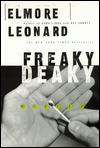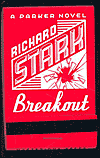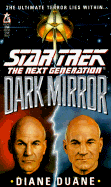 My girlfriend took this out of the library and I wanted to get another taste of Elmore Leonard. The only book of his I can remember reading is Mr. Majestyk, which I picked up for cheap right after seeing the movie with Charles Bronson (there's a great scene where the badguys shoot his watermelons).
My girlfriend took this out of the library and I wanted to get another taste of Elmore Leonard. The only book of his I can remember reading is Mr. Majestyk, which I picked up for cheap right after seeing the movie with Charles Bronson (there's a great scene where the badguys shoot his watermelons). It's quick reading, with many different characters revolving around each other in a moral morass of cons and backstabbing, with a thick strain of romance for the protagonist driving the whole thing forward. Some ex-radicals from the '60s decide to try to extort money from a rich friend of theirs who has become basically brain dead through excessive partying. He's like Ozzie and he has this ex-Black Panther as his manservant who is also scamming him. An explosives expert who just left his department and then gets suspended gets involved to help a woman who'd been sexually assaulted by the wasted millionaire. I think these are classic Elmore Leonard plots (think Get Shorty or Jackie Brown) and they are entertaining in their convolutions. They also make people look pretty morally fallible.
Ultimately, though, this one just didn't grab me. The style is not sparse enough to be really tough (like Richard Stark), though that's the milieu he's aiming for, nor is it wacky enough to be truly fun (like Carl Hiaasen). So it basically boils down to a small crime story with decently portrayed but not all that interesting characters. It was okay and I'd grab other Elmore Leonards if I was desperate, but I won't be picking up any more in the near future.
 Richard Stark is my favorite author. He is the pseudoym of Donald E. Westlake who has written all kinds of crime and mystery novels, including the screenplay for The Grifters. The Stark books were a series of caper novels, written in the early '60s and early '70s starring a tough, methodical and cold-blooded thief named Parker. They kicked ass. He wrote the last of the series "Butcher's Moon" in 1974 and it was a perfect ending to the series. For whatever reasons, he started writing Parker books again '97 and sadly they just weren't as good. The plots weren't as tight, Stark had trouble fitting Parker into the '90s and Parker just wasn't himself. He talked way too much, put on disguises, things like that. In the original series, there was no fooling around. It had lines like "Parker shot him." or "Parker hit him twice." or "Parker waited."
Richard Stark is my favorite author. He is the pseudoym of Donald E. Westlake who has written all kinds of crime and mystery novels, including the screenplay for The Grifters. The Stark books were a series of caper novels, written in the early '60s and early '70s starring a tough, methodical and cold-blooded thief named Parker. They kicked ass. He wrote the last of the series "Butcher's Moon" in 1974 and it was a perfect ending to the series. For whatever reasons, he started writing Parker books again '97 and sadly they just weren't as good. The plots weren't as tight, Stark had trouble fitting Parker into the '90s and Parker just wasn't himself. He talked way too much, put on disguises, things like that. In the original series, there was no fooling around. It had lines like "Parker shot him." or "Parker hit him twice." or "Parker waited." Okay, I just crossed a threshold to a higher levil of nerdiness. I just read a Star Trek novel, Next Generation at that. The author was recommended as one of the better of the series. I have nothing to compare it with, but Dark Mirror was entertaining and fun to read, but probably would appeal mainly to those who were familiar with the TV show. I watched the first few seasons of Next Generation and quite enjoyed it when it stayed on strategic and exploratory subjects. It started to get more and more soap-operaesque as the seasons went on and I dropped it.
Okay, I just crossed a threshold to a higher levil of nerdiness. I just read a Star Trek novel, Next Generation at that. The author was recommended as one of the better of the series. I have nothing to compare it with, but Dark Mirror was entertaining and fun to read, but probably would appeal mainly to those who were familiar with the TV show. I watched the first few seasons of Next Generation and quite enjoyed it when it stayed on strategic and exploratory subjects. It started to get more and more soap-operaesque as the seasons went on and I dropped it. They have a giant used book sale at this Arena in Rosemount every year. I think most of the books are the ones the libraries are getting rid of. I picked this book up there, on a whim. It was a hardback missing the dust jacket, so pretty anonymous but the age and quality of the paper and binding caught my eye. It was written in 1973, originally in French, and is the true story of a french cop hunting down criminals in Paris in the period after the end of the Second World War. The author is the cop (flic is slang for cop in France) and he prefaces the book with a bit of bitterness, suggesting that all the books about crime are written from the criminals perspective and he wanted to show what it was like to be a cop.
They have a giant used book sale at this Arena in Rosemount every year. I think most of the books are the ones the libraries are getting rid of. I picked this book up there, on a whim. It was a hardback missing the dust jacket, so pretty anonymous but the age and quality of the paper and binding caught my eye. It was written in 1973, originally in French, and is the true story of a french cop hunting down criminals in Paris in the period after the end of the Second World War. The author is the cop (flic is slang for cop in France) and he prefaces the book with a bit of bitterness, suggesting that all the books about crime are written from the criminals perspective and he wanted to show what it was like to be a cop. This is another one of Banks' Culture novels, a collection which I've really loved. He is a great moralist, great in the sense that his books are powerfully moral without ever being preachy or getting in the way of the story. Feersum Endjinn concerns the earth far in the future. The technological and social situation is quite complex, almost too complex to describe here, but basically the future earth is in danger of "The Encroachment" a wave of black dust that may block out the sun and thus freeze the solar system. Instead of working together to address the problem, the leaders are fighting a civil war. Everyone lives in the ruins of giant statues and castles and have access to a virtual reality called the Crypt, all of which was left by a previous society. They don't know much about them, but suspect they have a way to fight the Encroachment. The book traces the paths of the various characters whose actions will impact the plot.
This is another one of Banks' Culture novels, a collection which I've really loved. He is a great moralist, great in the sense that his books are powerfully moral without ever being preachy or getting in the way of the story. Feersum Endjinn concerns the earth far in the future. The technological and social situation is quite complex, almost too complex to describe here, but basically the future earth is in danger of "The Encroachment" a wave of black dust that may block out the sun and thus freeze the solar system. Instead of working together to address the problem, the leaders are fighting a civil war. Everyone lives in the ruins of giant statues and castles and have access to a virtual reality called the Crypt, all of which was left by a previous society. They don't know much about them, but suspect they have a way to fight the Encroachment. The book traces the paths of the various characters whose actions will impact the plot.  My dad lent me this because he wanted to know what I "thought about it." This worried me, but he assured me that it was an entertaining read and he was correct. It's kind of a heroic adventure (almost pulp) novel taking place in early 18th century england, when the modern notion of money and markets was just starting to develop. The hero is a jewish ex-boxer who has set himself up as a sort of Rennaisance bounty hunter, hunting down criminals and returning stolen material. It's a great idea, because the period is full of fantastic adventure potential. From the perspective of an entertaining read, it's pretty well executed. The plot is engaging and the characters, especially the hero, are well drawn out. There's lots of satisfying butt-kicking and revenge-getting. The plot becomes a bit overly complex and its mystery dependent more on many others holding out information rather than any real detective work. The author did some study in the field and knows the period well, but the language, the thinking and a lot of the goings-on in the book seem just a bit too contemporary. Probably it had to be done to make a rollicking adventure, but I guess I would have liked just a bit more detail and period verisimillitude. Compared, for instance, to Neal Stephenson's portrayal of the same period in his recent trilogy, A Conspiracy of Paper seems simplified, as if written for a poorly educated audience (i.e. the American book-buying public). Still, tons of fun and I'd definitely recommend it for a vacation read.
My dad lent me this because he wanted to know what I "thought about it." This worried me, but he assured me that it was an entertaining read and he was correct. It's kind of a heroic adventure (almost pulp) novel taking place in early 18th century england, when the modern notion of money and markets was just starting to develop. The hero is a jewish ex-boxer who has set himself up as a sort of Rennaisance bounty hunter, hunting down criminals and returning stolen material. It's a great idea, because the period is full of fantastic adventure potential. From the perspective of an entertaining read, it's pretty well executed. The plot is engaging and the characters, especially the hero, are well drawn out. There's lots of satisfying butt-kicking and revenge-getting. The plot becomes a bit overly complex and its mystery dependent more on many others holding out information rather than any real detective work. The author did some study in the field and knows the period well, but the language, the thinking and a lot of the goings-on in the book seem just a bit too contemporary. Probably it had to be done to make a rollicking adventure, but I guess I would have liked just a bit more detail and period verisimillitude. Compared, for instance, to Neal Stephenson's portrayal of the same period in his recent trilogy, A Conspiracy of Paper seems simplified, as if written for a poorly educated audience (i.e. the American book-buying public). Still, tons of fun and I'd definitely recommend it for a vacation read.
 Buddha's Money was discovered,
Buddha's Money was discovered, 


